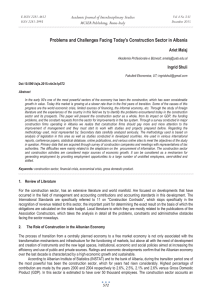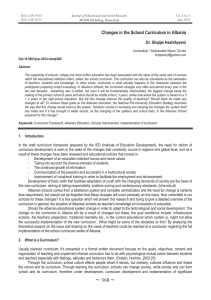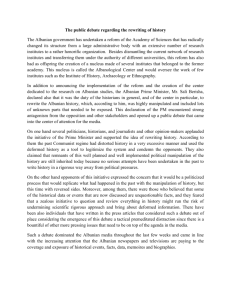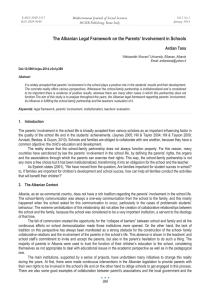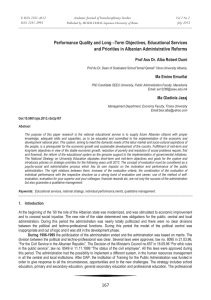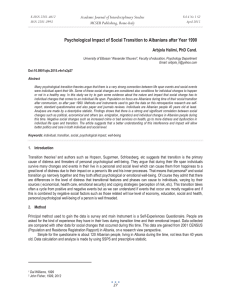The Perspectives of the International Business Activities, Globalization, Development of
advertisement
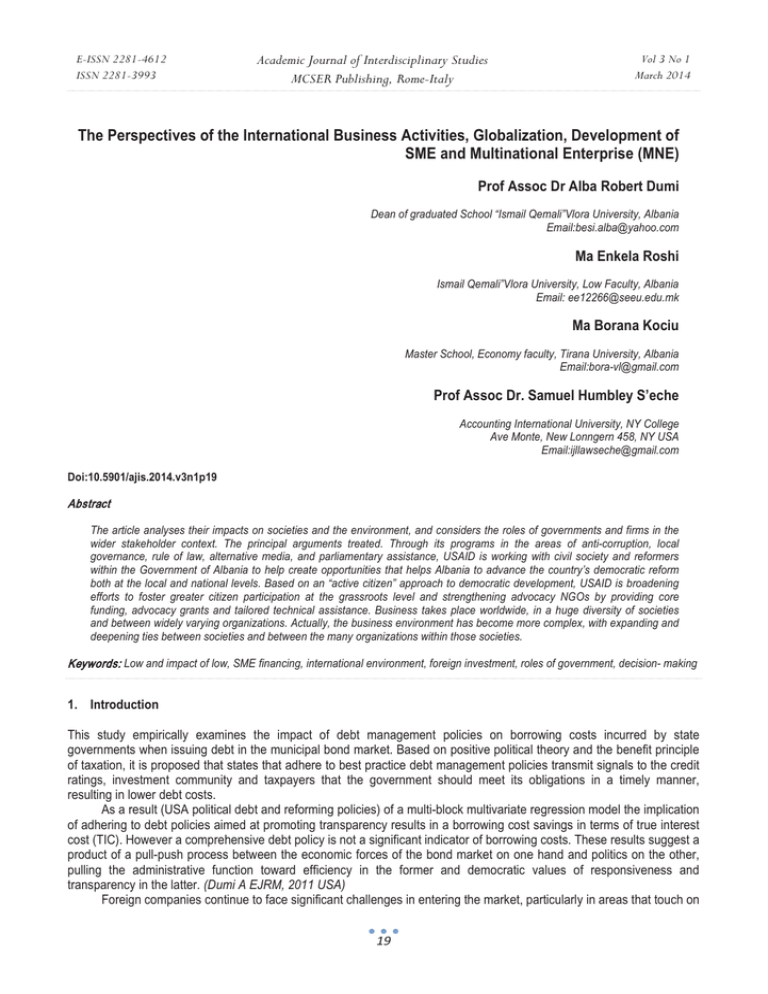
E-ISSN 2281-4612 ISSN 2281-3993 Academic Journal of Interdisciplinary Studies MCSER Publishing, Rome-Italy Vol 3 No 1 March 2014 The Perspectives of the International Business Activities, Globalization, Development of SME and Multinational Enterprise (MNE) Prof Assoc Dr Alba Robert Dumi Dean of graduated School “Ismail Qemali”Vlora University, Albania Email:besi.alba@yahoo.com Ma Enkela Roshi Ismail Qemali”Vlora University, Low Faculty, Albania Email: ee12266@seeu.edu.mk Ma Borana Kociu Master School, Economy faculty, Tirana University, Albania Email:bora-vl@gmail.com Prof Assoc Dr. Samuel Humbley S’eche Accounting International University, NY College Ave Monte, New Lonngern 458, NY USA Email:ijllawseche@gmail.com Doi:10.5901/ajis.2014.v3n1p19 Abstract The article analyses their impacts on societies and the environment, and considers the roles of governments and firms in the wider stakeholder context. The principal arguments treated. Through its programs in the areas of anti-corruption, local governance, rule of law, alternative media, and parliamentary assistance, USAID is working with civil society and reformers within the Government of Albania to help create opportunities that helps Albania to advance the country’s democratic reform both at the local and national levels. Based on an “active citizen” approach to democratic development, USAID is broadening efforts to foster greater citizen participation at the grassroots level and strengthening advocacy NGOs by providing core funding, advocacy grants and tailored technical assistance. Business takes place worldwide, in a huge diversity of societies and between widely varying organizations. Actually, the business environment has become more complex, with expanding and deepening ties between societies and between the many organizations within those societies. Keywords: Low and impact of low, SME financing, international environment, foreign investment, roles of government, decision- making 1. Introduction This study empirically examines the impact of debt management policies on borrowing costs incurred by state governments when issuing debt in the municipal bond market. Based on positive political theory and the benefit principle of taxation, it is proposed that states that adhere to best practice debt management policies transmit signals to the credit ratings, investment community and taxpayers that the government should meet its obligations in a timely manner, resulting in lower debt costs. As a result (USA political debt and reforming policies) of a multi-block multivariate regression model the implication of adhering to debt policies aimed at promoting transparency results in a borrowing cost savings in terms of true interest cost (TIC). However a comprehensive debt policy is not a significant indicator of borrowing costs. These results suggest a product of a pull-push process between the economic forces of the bond market on one hand and politics on the other, pulling the administrative function toward efficiency in the former and democratic values of responsiveness and transparency in the latter. (Dumi A EJRM, 2011 USA) Foreign companies continue to face significant challenges in entering the market, particularly in areas that touch on 19 E-ISSN 2281-4612 ISSN 2281-3993 Academic Journal of Interdisciplinary Studies MCSER Publishing, Rome-Italy Vol 3 No 1 March 2014 property rights. Despite advancements government bureaucracy and inefficiency greatly hampers the ability to hold successful, open and transparent government tenders. They are under-equipped to handle essential tasks. These are primarily to manage transition, provide the regulatory/administrative framework for the market, establish relations with the international community and negotiate and manage aid flows. But these tasks must be carried out while re-establishing order and maintaining social safety nets, under conditions of budget stringency. It is emphasized that the multinational enterprise (MNE), central to international business activities, covers a variety of organizations, large and small and the growing interactions between organizations, governmental and societal players are resulting in a broader view of the business organization in society. This argument looks at varying perspectives on globalization, often argued to be the defining characteristic of our times. Albania has put in place a liberal foreign investment regime, including a 10 percent flat corporate and income tax and has taken measures to improve the business climate by streamlining business procedures through e-government reforms. Dumi A EJRM, 2011 USA These improvements along with NATO membership and progress toward EU integration have contributed to the increase in invests interest during the last couple of years. Promising sectors for foreign investors and include: energy (including alternative energies), mining, transportation, telecommunications, and tourism. It’s very important to reach those who take lessons, be motivated to apply them. (Dumi A EJRM, 2011 USA) Source: Gene Klan Holkers, of the Center for Creative Leadership and Innovation, year 2010, Dumi A, EJRM, 2011 USA The fact that e-learning is available does not mean that it will be used. There are many reasons why it can`t happen: poor content, poor implementation plan, the discrepancies between students and business needs, lack of management support, poorly integrated components, lack of time or place for the training, lack of or ineffective marketing, the failure of values in organizational training, etc. Whatever the reason or combination of them, the end result is the same: the formation does not reach the target and the objectives of the organization valuable resources are dissipated. To avoid all these six areas should be considered: Planning, coordination, integration, motivation and support, marketing and communications, evaluation and improvement. 1.1 Ethical and legal issue in market strategy The selection of a retail market strategy is based on an analysis of the environment and the firm’s strengths and weaknesses. When major environmental changes occur the current strategy statement and the reasoning behind it are 20 E-ISSN 2281-4612 ISSN 2281-3993 Academic Journal of Interdisciplinary Studies MCSER Publishing, Rome-Italy Vol 3 No 1 March 2014 reexamined. The retailer’s market strategy must be consistent with firm’s financial objectives. Financial variables such as sales, cost, expenses, profits, assets, liabilities, and owner’s equity are used to evaluate the market strategy and implementation. A retailer’s organizational design is intimately related to its market strategy. The organizational structure must coordinate the implementation of the retailing strategy by buyers and store managers. On a per capita basis, however, the major EE cities typically have very high volumes of traditional shopping centre space, per capita, when compared to more mature European cities.This suggest a number of markets are saturated. 1.1.1 Organizational structure of SME The strategic country’s geographic position places it at the crossroads of Western and Eastern Europe makes it a stable U.S. ally, a member of NATO, the WTO and a probable candidate status in the European Union. (Glowenn S, MSCER 2010) Although FDI has increased during the last couple of years, it still remains among the lowest in the region with a significant part of it coming from privatizations. Despite progress in reforms the major factors hindering FDI seem to remain the same: widespread corruption, weak law enforcement, insufficiently defined property rights, lack of developed infrastructure, a sluggish government bureaucracy and frequent changes in the legal framework. (Dumi A EJRM, 2011 USA) Source: An Overview of Public Administration in Albania pg 6 year 2008, THANASI Durata (Internet link) The problem lies in policies that respond to the bond market but virtually exclude any other community interest in policy making. It is recommended that openness in government and allowing taxpayers to understand government services are essential goals in ensuring responsible citizen oversight and providing taxpayers the opportunity to be less likely to propose restrictive initiatives or force dramatic political or management changes through the electoral process or bond referenda. H 1: Moreover, many large organizations now see themselves as truly global in scope, not rooted in any one society. The aim of this article is to present an overview of the international environment, highlighting the differing levels, from local and national, to regional and international. The discussion focuses on the main identifying features of the business organization, including ownership and decision-making. H 2: The implementation of the strategy involves all the working groups in planning, designing, conducting product or service, development, evaluation and marketing. The implementation of the strategy is the process where you include all groups working in the management supervisory in the accomplishment of its mission. H 3: If during the process of implementing the strategy, the strategy chosen are not able to overcome the difficulties arising from the external or internal shortcomings in the company then the company can change the strategy, choosing one of the alternative scenarios defined in a strategic SWOT analysis carried out above to overcome difficulties and facilitate the work of all groups to achieve their goals in ful-filling the mission. 1.2 Albanian Local Government Programs and Projects Refers to European Community, the difference of single states policy applied to grow the own international trade, are small. What is the real situation in states not members of European Community, like Albania, according to international business environment? The external environment includes an array of dimensions, including economic, political, legal and technological factors. The article analyses their impacts on societies and the environment, and considers the roles of governments and firms in the wider stakeholder context. (Dumi A EJRM, 2011 USA) 21 E-ISSN 2281-4612 ISSN 2281-3993 Academic Journal of Interdisciplinary Studies MCSER Publishing, Rome-Italy Vol 3 No 1 March 2014 Source: Gene Klan Holkers, of the Center for Creative Leadership and Innovation, Internet link, www.smeilinois.edu 2. Rule of Law Albanian Development Program Rule of Law Albanian Development Program core programmatic objectives include: (1) increasing the judiciary’s knowledge of the European Court of Human Rights (ECHR); (2) enhancing the institutional capacity of the Independent Bar Association; (3) improving the quality of legal education; and (4) fostering an effective environment for human rights protection. Administrative changes in Albanian public policies as an obstacle to the operating foreign investments, comparison of EU like these factors: • A dynamic local government leadership • A coherent strategy acted upon with determination • A healthy climate of cooperation with business • Improving the quality of legal rules. • Local government’s investment initiatives to jumpstart the stagnant economy. • Creative use of EU funds to implement local policy. • Efficient municipal administration. • Coherent links among urban planning, infrastructure and economic development. The Access to Information for Albanian Community Involvement program focuses on: (1) Training of public officials, local government representatives and civic groups on freedom of information, (2) media outreach to inform and update the public and the government on freedom-of-information, (3) production of a freedom-of-information (FOI) website; (4) Improving mechanisms for proactive publication of government-held information; and (5) free legal counseling to citizens and community organizations on FOI. 3. Objectives of this Paper Research 22 E-ISSN 2281-4612 ISSN 2281-3993 Academic Journal of Interdisciplinary Studies MCSER Publishing, Rome-Italy Vol 3 No 1 March 2014 These results suggest a product of a pull-push process between the economic forces of the bond market on one hand and politics on the other, pulling the administrative function toward efficiency in the former and democratic values of responsiveness and transparency in the latter. The problem lies in policies that respond to the bond market but virtually exclude any other community interest in policy making. It is recommended that openness in government and allowing taxpayers to understand government services are essential goals in ensuring responsible citizen oversight and providing taxpayers the opportunity to be less likely to propose restrictive initiatives or force dramatic political or management changes through the electoral process or bond referenda. The external environment includes an array of dimensions, including economic, political, legal and technological factors. The article analyses their impacts on societies and the environment, and considers the roles of governments and firms in the wider stakeholder context. The principal arguments treated. Through its programs in the areas of anticorruption, local governance, rule of law, alternative media, and parliamentary assistance, USAID is working with civil society and reformers within the Government of Albania to help create opportunities that helps Albania to advance the country’s democratic reform both at the local and national levels. Based on an “active citizen” approach to democratic development, USAID is broadening efforts to foster greater citizen participation at the grassroots level and strengthening advocacy NGOs by providing core funding, advocacy grants and tailored technical assistance. 3.1 Analyses selected indicators for responsiveness of public administration 3.1.1 Legal changes between two systems. Strengthen rule of law through implementation of a reform strategy for the judiciary, ensuring the independence, efficiency and accountability of judicial institutions. Strengthen the fight against organised crime, based on threat assessment and proactive investigation, increased cooperation with regional and EU partners and better coordination of law enforcement agencies. Improve treatment of detainees in police stations, pre-trial detention and prisons. Strengthen the judicial follow-up of cases of ill-treatment and improve the application of recommendations of the Ombudsman in this field. (Gene Klan Holkers, JERSC 2010) Effectively implement the government's anti-corruption strategy and action plan, remove obstacles to investigations, in particular of judges, ministers and Member of Parliaments; develop a solid track record of proactive investigations, prosecutions and convictions in corruption cases at all levels. The business environment may be visualized in terms of layers, beginning with the immediate internal environment within the organization, and moving outwards to the external environment surrounding the business and influencing its organization and operations. While only a few decades ago these external aspects were seen as centering on the home country of the business, the environmental horizon of business has now widened to take in a host of international forces, which interact with national and local factors.Tensions exist between an organization and the external forces that impact on it, from local through to international, and these tensions are reflected in its internal environment. For this, when we think of international business, we tend to think of large multinationals, but most of the world’s businesses are very much smaller, and, increasingly, these smaller firms are becoming international in their outlook. Nowadays, thanks to advances in communication technology and transport, it is easier for companies to expand a variety of business activities across national borders. A large American corporation such as IBM may seem to have very little in common with a family-run firm in Tirana that selling its products or purchasing raw materials abroad, and go on to producing its products abroad. Even if their answers on how to achieve a smooth-running and efficient organization and how to satisfy the needs of customers may be different, both companies in their own way will affronting universal issues. (Albanian progress raport 2012) Like we know in the past the most important factors which influenced the firms were cultural and social, legal and technological factors. Now the factors which compose the economic policy and influenced international environment are not so unpredictable. The problem is that are complicated for the different decision making stakeholders at a time of a stagnant economy. 4. Methodology of this Paper Research The research methodology used to complete this article is that to compare the latest international economic policies to respond to different features present or not in them. To pursue this purpose we will use as a reliable research sources 23 Academic Journal of Interdisciplinary Studies MCSER Publishing, Rome-Italy E-ISSN 2281-4612 ISSN 2281-3993 Vol 3 No 1 March 2014 such as the European community, the Ministry of Economy of Albania, etc. Albanian companies act in an environment that is more or less favorable to them. The environment is significantly limited by the institutional framework that the rules of the game and is controlled by public administration and is responsive to the needs of foreign companies. In the empirical part of the paper, we analyze selected indicators for responsiveness of the public administration in selected Albanian programs, compared European Union (EU). First choice Second choice Indicator A 4 4 Indicator B 18 7 Indicator C 7 5 Indicator D 9 6 Criteria X 6 4 4.1 The real situation of financial sector in Albania The financial sector in Albania has in general been spared from the global financial turmoil, primarily due to the low amount of loans in relation to total deposits. Also the lack of a housing/construction bubble has minimized pressure on the banks. However, a significant reduction in bank deposits took place in the fall of September 2008 as individuals withdraw their money due to fear from losing their savings. (Gene Klan Holkers, JERSC 2010) values Ranks 2 1 14 2 5 3 6 4 17 5 7 6 17 7 8 8 19 9 Since October 2008 deposits dropped by about 15% and during 2009 they were below their top level. After summer 2009 there has been a stable increase in bank deposits and by the end of 2009 they reached their pre-crisis level. Lower deposits created some liquidity issues but banks were well equipped to face the situation. Banks have increased their equity capital to better face the situation and also BOA has an active monitoring program to ensure enough liquidity in the banking sector. The financial sector is totally dominated by commercial banks funded with private capital. Currently, 16 banks are operating in the country – two domestically owned banks and 14 foreign or joint ventures. (Albanian progress raport 2012) Referring to the above mentioned financial crisis which influenced companies stocks, we can say that, on Albanian companies has little or no influence. This, not only for the mentioned reasons above, but because only 3% of the Albanian companies are with private capital trading in stock exchange, the rest are joint stock companies with public capital. (Gene Klan Holkers, JERSC 2010) 4.2 The direct investiments in Albania in 2009-2010 FDI during the first nine months of 2009, 2010 is estimated to have reached 580 or 588 million euro despite optimistic 24 E-ISSN 2281-4612 ISSN 2281-3993 Academic Journal of Interdisciplinary Studies MCSER Publishing, Rome-Italy Vol 3 No 1 March 2014 GOA projections for 2009 fueled mainly by strong investor interest witnessed during 2007-2008. A large part of FDI is due to privatizations. The Albanian government collected 103 million Euro from the privatization of 76 percent of the shares of the distribution arm of Albanian Power Corporation; 48 million Euro from the privatization of 12.6 percent of AMC state controlled shares; 5 million euro from the privatization of 40% of GOA controlled shares of the United Bank Albania. INSIG (insurance company) privatization failed during the negotiation process with the winner and it might take place during 2011. (Albanian progress raport 2012) With view to administrative capacity, the analysis clearly shows that there is often staff turnover at management and operational level in the line ministries and central level agencies. However, good staffing is essential for the achievement of the IPA programming objectives, the sector-based approach and the success of the European Integration process in general. (Richard Anderson, JORCP, 1987) The evaluation reckons that outcome and results of IPA assistance are still in very early stage having very few of the planned projects completed. It is recommended to strengthen the ownership of the national authorities on the programming process by making them more involved in the whole process of programming and implementation by e.g. committing progressively higher rates co-financing rates from year to year. Furthermore, more efforts should be made to involve beneficiaries in implementation and monitoring of on going IPA assistance. Micro, small and medium-sized enterprises (MSMEs) are the driving force for Albania’s economic growth and job creation. They account for 99.5% of private enterprises and about 75% of total employment in non-agricultural sectors. However, the development of MSMEs has been hindered by their weak competitive capacity, their limited access to commercial credit and the un-favourable business environment caused by unfair competition, and inconsistent application of fiscal laws and regulations. (Dumi A, MSCER 2011) In addition, poor infrastructure (energy, communication, and transportation), disputable property ownership, and weak rule of law discourage domestic and foreign investments. (Albanian progress raport 2012) Relations with the EU In February 2008, the Council adopted a new European partnership with Albania. The following priorities for IPA support (which could be implemented by annual or multiannual programmes) over the period covered by this MIPD have been identified: • Strengthen rule of law, ensuring the independence, efficiency and accountability of judicial institutions and enhance the fight against organised crime. (Gene Klan Holkers, JERSC 2010) • Support the public administration reform, with a view to enhancing professionalism and de-politicisation of public administration and to strengthening a transparent, merit-based approach to appointments and promotions and strengthen the fight against corruption at all levels. (Richard Anderson, JORCP, 1987) • Reinforce the protection of human rights, notably for women, children and persons belonging to minorities, and to effectively implement anti-discrimination policies. (Gene Klan Holkers 2010) To support acquis-related issues, in particular, administrative capacity, adoption and enforcement of legislation and related investments in the transport sector, social sector, as well as in the environment, climate change and agriculture sectors. To achieve the priorities selected for support in the programming period 2011-2013, the Commission will focus its assistance primarily on the following sectors: 1. The European Partnership Document for Albania adopted by Council Decision of 18 February 2008 on the principles, priorities and conditions contained in the European Partnership with Albania and repealing Decision 2006/54EC. 4.3 Public Debt and Albanian Situation Analyzing the relationship between economic shocks and public debt that is having lately the European Community (we refer in particular to the crisis of the GDP of the two member states like Greece and Italy) budgeting decisions in the context of local economic shocks reveal the local fiscal policy priorities. The analysis of Albanian incomes, finds that current expenditure paths are more influential when making cuts than when expanding budgets. (Gene Klan Holkers, JERSC 2010) Public Strategies employees strive to support and improve the communities in which they live and work. The government support programs that help those in need who strive to provide for their families; and provide the youth of the community with the tools necessary to become leaders. Also focus on two primary areas to ensure the company provides meaningful contributions to the community. Our corporate contributions of time and money go to promoting philanthropy and to youth leadership development through initiatives that produce measurable outcomes and sustainable results in these two areas. (Dumi A, MSCER 2011) Government regulations applied to counties, like Albania once classified as not in attainment of ambient air quality standards affect local tax bases. Local communities are also seen to employ some short-term use of reserve funds when 25 E-ISSN 2281-4612 ISSN 2281-3993 Academic Journal of Interdisciplinary Studies MCSER Publishing, Rome-Italy Vol 3 No 1 March 2014 facing negative expenditure pressures, but these funds are not used to completely prevent expenditure cuts. (Gene Klan Holkers 2010). Furthermore, communities do not use debt as a mitigating response to external tax base pressures, but instead alter expenditure patterns. Following the June 2009 parliamentary elections, the new Albanian Government announced in their Government programme that Justice and Home Affairs, as well as the rule of law, to be one of their key priorities. However, a sector strategy to reform the judiciary does not yet exist. Part of the reform of the sector and rated as one of the ambitious plans of the Ministry of Justice is the drafting and approval of the Justice Sector Strategy. (Dumi A, MSCER 2011) In this context, a consultation with stakeholders took place in July 2010, during which the draft strategy was thoroughly discussed. In addition, the Ministry has prepared a draft action plan and is currently submitting it to various stakeholders for recommendations and suggestions. As a consequence, the strategy is expected to be adopted by the beginning of 2011, after a final consultation process with all the stakeholders. (Richard Anderson, JORCP, 1987) Science impact. If we refer to some social relationship they have not been adapted by the previous legislation,let say they were labelled as “Taboo”.If we stop for a moment to private property which today is among the issues to be addressed by law,such right was not recognized before ’90-s and does not enjoy protection from the law of that time(communism system).( Fiedler, F. E. (1996) Not any legislationof any state has undergone “significant important” changes or has ever been part of changes compared here with the changes that our leglislation has suffered. 1How can we qualify and assert these changes that present legislation has undergone, compared to that before the ’90-s If I d,well in that fragmented aspect,in the sense that how further is the range of right and freedom that individuals enjoy today ? 5. Conclusions and Recommendation Naturally, at the end of this article we will have a complete vision of Albanian situation. We are going to illustrate the nature of globalization, highlighting trends in globalized production and market, by contrasting the key features of foreign direct investment (FDI), foreign indirect investment and other modes of international operations. The whole Society and Albanian Local Government Support Program (CSLGP) aims to increase the level of informed and organized civic activism at the local and national levels, along with more participatory, decentralized, accountable governance that leads to a more democratic society. (Richard Anderson, JORCP, 1987) The project will reach this objective through three programmatic components: (1) local government and civil society collaboration, (2) fostering civic participation, advocacy and activism, and (3) facilitating decentralization and local fiscal autonomy. 2Project aims to support Albania rapprochement through developing new business partnerships and regional professional networks; engaging civil society in alliance-building to further contribute to Albania normalization; and supporting government and non-government efforts toward rapprochement with researchAdministrative changes in Albanian public policies as an obstacle to the operating foreign investments, comparison of EU are progressed in Albania like as: • Developing: • International investments founds • Entrepreneurship ambition, • Marshalling resources to exploit business opportunity, • State regulatory statistical and tax reporting Using the EU measurements and assessment of different areas of the business, namely the production of goods and services, can take place smoothly in Albania. PSI worked closely with high-level public officials and community leaders and provided critical guidance and strategic planning.3 On an ongoing basis, PSI continues to adapt to: the changing needs of the communities we serve, legislative and administrative directives, research findings and promising practices from the field. These efforts include: • Providing customized training and learning opportunities for partners. • Managing the daily activities of project staff. • Monitoring large-scale project implementation benchmarks. An Overview of Public Administration in Albania pg 6 year 2008, THANASI Durata (Internet link) UNICEF report 2007, 2009, 2010 Albanian development strategy, Albanian Finance incomes 2009, pg 10 3 United Bank Albania.& INSIG incomes 2008, Albanian Local Government Support Program (CSLGP) 1 2 26 E-ISSN 2281-4612 ISSN 2281-3993 • Academic Journal of Interdisciplinary Studies MCSER Publishing, Rome-Italy Vol 3 No 1 March 2014 Monitoring the new opportunities of developing and LC of new business Source: Richard Anderson “That roar you hear is food lion “Business Week August 2011 Local communities are also seen to employ some short-term use of reserve funds when facing negative expenditure pressures, but these funds are not used to completely prevent expenditure cuts. Furthermore, communities do not use debt as a mitigating response to external tax base pressures, but instead alter expenditure patterns. (Dumi A, MSCER 2011) Additionally, PSI conducts field research that may lead to adjustments to the program in order to meet greater project goals. This has resulted in a high level of trust with state officials and more effective service delivery because program adjustments are made in a timely manner. 6. Results and Profits from this Research Administrative changes in Albanian public policies as an obstacle to the operating foreign investments, comparison of EU. This includes partnerships with community-based organizations, public and private colleges, universities, public school teachers, public health departments. Additionally, more number of community leaders have been trained to deliver educational workshops; PSI has developed a robust workshop leader database, which permits remote access to (and entry of) service delivery information. 4This will be an important point of administrative changes in Albanian public policies as an obstacle to the operating foreign investments, comparison of EU. Entrepreneurship ambition has worked to support changes in Albanian law that would offer anti-discrimination protections in keeping with international standards. (Dumi A, MSCER 2011) The another point of administrative changes in Albanian public policies as an obstacle to the operating foreign investments, comparison of EU is: (1) International investments contributed to the improvement of Albania’s financial regulatory environment which has strengthened public confidence in the banking system and has provided a more secure, efficient and transparent financial system to meet the credit, savings and insurance needs of businesses and individuals. As a result, there had been a steady increase in bank deposits and a rapid flow of commercial credit to the private 4 Albanian Government finance results 2009 vol 12 page 21, 25, 29 27 E-ISSN 2281-4612 ISSN 2281-3993 Academic Journal of Interdisciplinary Studies MCSER Publishing, Rome-Italy Vol 3 No 1 March 2014 sector in recent years before the global financial crisis occurred. (2) PSI worked with the research team to conduct site selection and provide consultation on outcome measures, implementation findings and sustainability strategies. PSI provided guidance and technical assistance to multiple sites regarding: • Program design • Staffing (i.e. job descriptions, organizational structure) • Operations (i.e. recruitment, retention, workshop delivery) • Management tools (i.e. data tracking and reporting) • Case management • Marketing and program outreach • Building community partnerships References An Overview of Public Administration in Albania pg 6 year 2008, THANASI Durata (Internet link) Albanian publisher by Albania international bank 2010, report Albania Government journal, pg 14, 27,39 year 2009 United Bank Albania.& INSIG incomes 2008, Albanian Local Government Support Program (CSLGP) Albanian Government finance results 2009 vol 12 page 21, 25, 29 Arieh Goldman “stages in the development of the supermarket “Juornalof retailing 51 pp 49-66 Dumi A, MSCER 2011, Rome Italy, “Leadership in Albanian region and its priorities under EU” pp 134,137,167 Exes 100 “Chain store Axe executive August 1990 p 43 Richard Anderson “That roar you hear is food lion “Business Week August 24 1987 pp 65-66 “58thAnnual report “Progresive grocer April 1991 p 8 U.S. Department of State, Center for Administrative Innovation, U.S. Embassies GovLeaders.org, author Cynthia McCauley, methodology pg, 128 year 2009 Gene Klan Holkers, of the Center for Creative Leadership and innovation pg 12, 23,28 year 2010 Koxhaj Andri, management & lidership 2007 LIaci Shyqyri “Management publishing 2003 Bundo Sherif “Risku dhe primi botimi 2001 Ciceri Beshir Drejtimi financjar I avancuar 2003 July 2006 column for GovLeaders.org, Ray Blunt, American society INCOMS, Public Sector Consortium, Public Sector and economic environment year 2007 Winter 2003-2004 issue of Albanian economical report, pg 147-123-158 UNICEF report 2007, 2009, 2010 Albanian development strategy, Albanian Finance incomes 2009, pg 10 28


